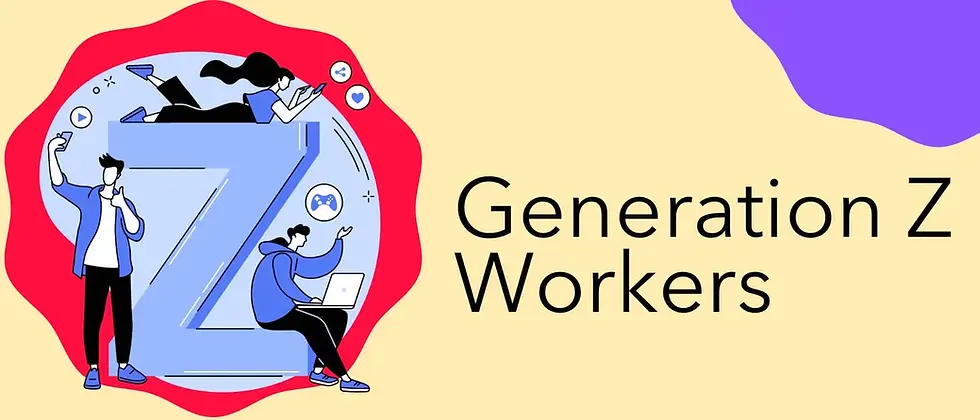Gen Z Isn’t from Another Planet; We Just Haven’t Learned Their Language Yet
- CJ Raymond

- Oct 24, 2025
- 3 min read

Every few decades, a new generation steps into the workplace and leaves leaders scratching their heads. With Generation Z, those born roughly between the mid-1990s and early 2010s, the confusion has reached intergalactic proportions. They’ve been called “alien-life-forms” for their digital habits, short attention spans, and insistence on doing things differently. But that label says more about leadership discomfort than generational dysfunction. Gen Z isn’t unknowable; they’re just fluent in a new language many leaders haven’t taken the time to learn.
The Misunderstanding
Much of the frustration surrounding Gen Z comes down to speed. They move quickly, expect transparency, and don’t wait for permission to adapt. Older leaders see this as impatience; Gen Z sees it as efficiency. They grew up in a world where information travels instantly, feedback loops are short, and hierarchy matters less than authenticity.
When a process drags or communication feels disingenuous, they disengage;
not because they lack respect, but because they’ve been trained to value clarity and relevance. Labeling these behaviors as “entitled” misses the point. They’re responding to the systems we built, not rejecting the idea of work itself. If we taught them to question authority, champion mental health, and seek meaningful careers, we shouldn’t be surprised when they take us at our word.
The Paradox of Digital Comfort
Yes, Gen Z are digital natives, but their relationship with technology is far more nuanced than most assume. Many are ambivalent toward technology; acknowledging both its power and its toll. Research from Freeman shows that 69% of Gen Z professionals feel technology has made them less connected, not more. Another global survey found that 45% wish life could slow down to a pre-internet pace. So while they still live online, they’re increasingly selective about how they show up. They’re drawn to authenticity over aesthetics, small communities over public feeds, and genuine experiences over curated ones. What older generations interpret as withdrawal is often self-protection. This isn’t rebellion; it’s recalibration. They’re trying to reclaim balance in a world that monetizes attention. For leaders, that’s an invitation to model healthier digital norms and create work cultures that prize focus and human connection.
What Actually Motivates Them
Purpose is Gen Z’s currency. According to Deloitte’s 2024 Global Gen Z and Millennial Survey, 86% say having a sense of purpose is central to job satisfaction. They want to know their work contributes to something beyond profit; whether that’s social impact, sustainability, or community wellbeing. They’re motivated by inclusion, belonging, and visible impact. A recent MDPI study found that recognition, well-being, and growth opportunities rank above pay for Gen Z engagement. And according to Radancy’s research, they’re drawn to employers who share their values and walk their talk on ethics and authenticity. Stability still matters, but it’s redefined. A Gen Z employee might stay two years in a role if it aligns with their purpose and offers learning opportunities. That’s not disloyalty; that’s strategic curiosity.
The Leadership Shift
Leading Gen Z doesn’t require gimmicks. It requires fluency in empathy, transparency, and adaptability. Start by listening more than assuming. Create feedback channels that are frequent, honest, and two-way. Replace rigid systems with flexible frameworks that allow experimentation and input. Most importantly, model what you preach. Gen Z has a low tolerance for performative leadership. If you talk about work-life balance but send emails at midnight, they’ll notice. If you promote diversity but avoid tough conversations, they’ll disengage. As Entrepreneur.com notes, attracting Gen Z talent means prioritizing individuality, flexibility, and purpose-driven work—not micromanagement and outdated hierarchies.
Bridging, Not Blaming
The “alien” metaphor falls apart once you stop viewing Gen Z as a problem to fix and start seeing them as a mirror. They’re reflecting the realities of a world we all helped create; digitally saturated, globally connected, ethically complex. They’re simply refusing to settle for outdated scripts. Leaders who meet them halfway will find a generation full of creativity, conviction, and conscience. They’re not asking for perfection, just honesty. And that’s not alien; it’s human.




Comments